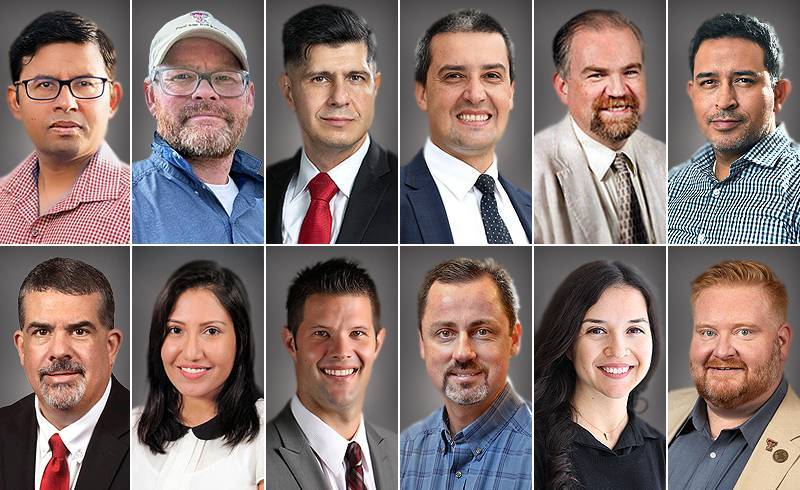
Texas Tech’s Davis College of Agricultural Sciences & Natural Resources is set to launch an ambitious strategic initiative designed to tackle pressing research challenges facing agriculture, natural resources and public health.

With a focus on interdisciplinary collaboration and impactful research, the college is aligning around two strategic themes: Sustainable Food, Fiber and Thriving Communities and One Health. The move marks an evolution in the college’s approach to research, one that emphasizes cross-disciplinary collaboration and mission-driven priorities.
“Complex and challenging issues and real-world problems are hard to solve within the boundaries of a single discipline,” said Davis College Associate Dean for Research Noureddine Abidi. “We need a cross-disciplinary approach to bring expertise together, break silos, and form teams and future leaders who can bring people to work together.”
At the heart of the new approach is the Prime Grand Challenges Catalyst Grant Competition, a program backed by up to $500,000 in funding from long-time supporters Gordon & Joyce Davis of Lubbock. The grant program is designed to foster transdisciplinary, translational and transformational research that not only addresses complex problems but also builds lasting capacity.
Undergirding all priority areas is the commitment to achieving greater resilience and adaptability, effective communication with all stakeholders, national security, and increasing the international impact of our mission areas, said Davis College Dean Clint Krehbiel.
In addition, he said, it offers an opportunity to create the capacity to answer these challenges through translational, transdisciplinary, and transformational research that focuses on Davis College’s strategic priorities.
The Prime Grand Challenges initiative will operate through eight strategic resource groups, each led by faculty experts in critical areas. These strategic resource group leaders serve as principal investigators and coordinators, leading team-building efforts and directing research and outreach that aligns with their respective themes.
Davis College Associate Dean for Strategic Initiatives & Assessment Darren Hudson said, “We believe that these complex problems require multi-disciplinary teams, and this approach will allow us to leverage expertise and resources to the greatest impact.”
The 2025-2027 Strategic Resource Group Leaders are:
- Sustainable Water Systems: Krishna Jagadish | Professor & Thornton Distinguished Chair | Department of Plant & Soil Science
- Sustainable Ecosystems & Landscapes: Scott Longing | Associate Professor | Department of Plant & Soil Science
- Integrated Crop & Livestock Systems: Alex Rocateli | Associate Professor | Department of Plant & Soil Science and Jhones Sarturi | Associate Professor | Department of Animal & Food Sciences
- Economic & Social Systems: Conrad Lyford | Professor & Luis Sandoval | Assistant Professor | Department of Agricultural & Applied Economics
- Food Safety, Security & Nutrition: Chance Brooks | Professor & Chair | Department of Animal & Food Sciences and Modhurima Amin | Assistant Professor | Department of Agricultural & Applied Economics
- Animal, Plant, Wildlife and Human Stress & Disease: Mike Ballou | Chair & Professor | Department of Veterinary Sciences and Warren Conway | Professor | Department of Natural Resources Management
- Animal-Human Bonds, Behavior & Welfare: Anastasia Stellato | Assistant Professor | Department of Animal & Food Sciences
- Rural Vitality & Community Well-Being: Jason Headrick | Assistant Professor | Department of Agricultural Education & Communications
Hudson emphasized that the research strategy reflects Davis College’s 2030 Strategic Plan and is part of the university’s broader research aspirations. Central to the initiative is a commitment to measurable outcomes.
“We are focused on solving these problems, but we must do so in a way that stewards our resources responsibly, so impact, effectiveness, and accountability are a centerpiece of our overall strategic plan,” he said.
Catalyst grant proposals must articulate specific, aspirational goals that go beyond incremental progress and demonstrate how the proposed work will contribute to longer-term sustainability through future external funding. Individual projects may receive up to $200,000 over two years, with the expectation of delivering tangible advancements in knowledge, products, or processes that benefit communities and ecosystems.
Proposals must have a clearly defined plan for submission to federal funding agencies, Hudson said. The deadline for submissions is July 15, with award announcements expected by August 31.
CONTACT: Noureddine Abidi, Associate Dean for Research, Davis College of Agricultural Sciences & Natural Resources, Texas Tech University at (806) 742-2808 or noureddine.abidi@ttu.edu
0610NM25 / PHOTO: (Top Row, L to R) Krishna Jagadish, Scott Longing, Alex Rocateli, Jhones Sarturi, Conrad Lyford, and Luis Sandoval; (Bottom Row, L to R) Chance Brooks, Modhurima Amin, Mike Ballou, Warren Conway, Anastasia Stellato, and Jason Headrick
